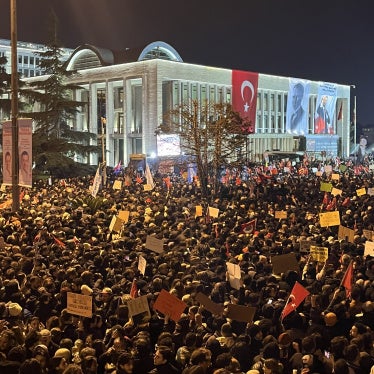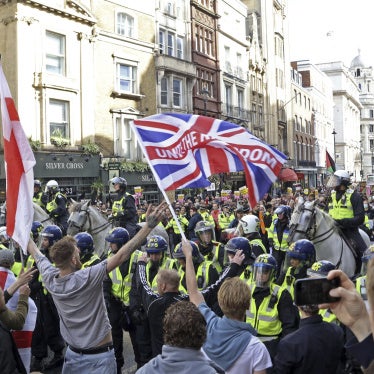Human Rights Watch today condemned the detention of 20,000 non-Muscovites by the Moscow police. City authorities have justified the round-ups as a security measure in response to the recent bombings in Russia, which have claimed about 200 lives so far. Government officials in Moscow have asserted that Chechens bear responsibility for the recent explosions.
"Let's not confuse the legitimate need for extra security with collective punishment," said Holly Cartner, executive director of Human Rights Watch's Europe and Central Asia Division. "The Moscow city government has a reflexive reaction in security emergencies—round up all the people with dark skin. These people inevitably become the victims of police brutality and extortion."
Moscow strictly enforces an onerous registration policy for all visitors. Even in peaceful times, police enforce the regulations by routinely detaining individuals to check registration documents; overwhelmingly, they detain people with the darker skin typical of natives of the Caucasus region, known in Russian as "blacks."
During the 1993 fighting between the parliament and the Kremlin, security forces forced 9,000 non-Muscovites out of the city, and claimed that an additional 10,000 left voluntarily.
"Our research has shown that the registration system serves as very convenient pretext for extortion," said Ms. Cartner. "It is not unusual for people with or without residence permits to be stopped three or four times in one day, and to be hit up for bribes each time." She noted that some non-ethnic Russians choose to isolate themselves indoors, to avoid the police altogether.
The police typically conduct identity checks in public places, such as markets and public transportation, but they also visit the private homes of refugees, or of people from Central Asia or the Caucasus, and may return to the same homes repeatedly. The police frequently use violence during such checks.
One victim of a recent identity check, an ethnic Chechen with a permanent residence permit for Moscow, told Human Rights Watch about his experience. On Friday, September 10, the day after a powerful blast killed an dozens of people in Moscow, masked police came to his home at approximately 3:30 pm. "I opened the door and they pushed my children away, and struck my wife," the man told a Human Rights Watch researcher. "As soon as they came in, they put a pistol to my forehead, and hit me in the back of my neck." While searching his home for approximately twenty minutes, the police beat and kicked the man as he lay on the floor. The Human Rights Watch researcher saw the bruises and scratches on the man's body.
Police did not have a warrant for the search, which found no evidence. It was the third time since the 1993-96 Chechen war that police had come to the man's home.
The police then brought him to an organized crime police unit. In a corridor at the police station, the man claimed, police were beating five other Chechens and asking them, "Do you know Khattab?" One of the leaders of an armed insurgency in Dagestan, in southern Russia, calls himself Khattab. Some Russian officials have suggested he is behind the Moscow bombings.
Also on Friday, September 10, a Human Rights Watch researcher witnessed a police search of the Daimokhk Chechen-Ingush cultural center, a meeting place for people from the Caucasus in Moscow. The police had no warrant for the search, but claimed it was merely an "inspection." The "inspection" was conducted by two masked policemen and three in plainclothes. They found nothing.








